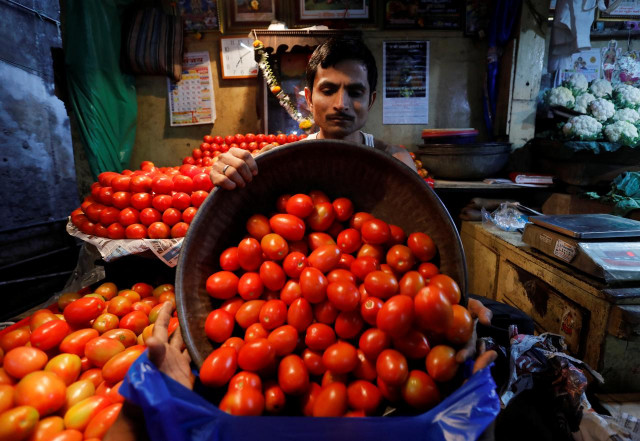Tomato prices hit 'triple century' in Quetta
Vendors blame shortage on local tomatoes from Balochistan sent to other provinces

Tomato prices in Quetta have skyrocketed, dealing a direct blow to household budgets. Once sold for Rs50 per kilo, tomatoes are now retailing at Rs280–300 per kilo. Just two days ago, they were Rs250, marking a nearly "six-fold jump" in a matter of days. Residents complain that Rs250 once fetched five kilos, but now barely buys one.
Vendors blame the shortage on local tomatoes from Balochistan being dispatched to other provinces, while Quetta remains dependent on imported Iranian tomatoes, already expensive in wholesale markets.
Other vegetables have also surged to record highs. In Quetta’s bazaars, lemons are selling at Rs800 per kilo, green chilies Rs200, bitter gourd Rs150, garlic Rs250, ginger Rs600, onions Rs300–350, potatoes Rs100–150, capsicum Rs250, carrots Rs100, cucumber Rs120, peas Rs400, okra Rs150, and cabbage Rs100 per kilo.
Read: SPI records 4.07% YoY increase
The price spiral is not confined to Quetta; other districts of Balochistan are also facing similar hikes in daily essentials. Citizens have demanded urgent government intervention to stabilise the markets, warning that unchecked inflation could spark public protests.
Beyond Quetta, cities across the country are facing steep hikes.
Karachi has seen the same spiral, though traders there have used the recent floods as an excuse to raise rates. Consumers point out that Sindh’s agricultural belt was not damaged and roads remained open, yet tomatoes that sold for Rs80 just weeks ago are now above Rs300.
Even warehouses stocked with dry vegetables and spices have reported hikes, fuelling suspicions of profiteering and hoarding.
While chicken prices have dropped, vegetable stalls remain punishingly expensive, and citizens urge the city administration to step into markets to verify the reality behind official claims.
In Rawalpindi, inflation has spread across the board, with rising petrol and diesel costs pushing up transport fares and in turn, commodity prices.
Read More: Prices spiral out of control in markets
Milk is selling for Rs220–240 per litre, yoghurt for Rs240–250 per kilo, and chicken meat for Rs600. Pulses and grains are also soaring: mash lentils cost Rs550, rice Rs400, and cooking oil and ghee up to Rs550 per kilo, while sugar has hit Rs190.
Meat has grown unaffordable for many households, with mutton priced at Rs2,400 per kilo and beef at Rs1,400.
Vegetable prices show the same pattern: tomatoes are Rs350 per kilo, peas Rs380, lemons Rs350, and ginger Rs600, while fruits once considered everyday staples — bananas, apples, grapes, and pomegranates — are all selling at record highs. Even Sunday bazaars and roadside stalls, traditionally the fallback for middle- and lower-income groups, now offer little relief.
Across the three cities, the trend tells a single story that the essential food items are beyond the reach of ordinary families.




















COMMENTS (1)
Comments are moderated and generally will be posted if they are on-topic and not abusive.
For more information, please see our Comments FAQ